Variously described as a 'canon', 'tradition', 'genre', 'form', 'mode', and 'register', Irish gothic literature suffers from a fundamental terminological confusion, and the debate over exactly which term best applies has been both heated and, ultimately, inconclusive in the past thirty years. The dominant theorization of Irish gothic literature to emerge in late-twentieth and early-twenty-first century scholarship has been driven by psychoanalytic readings of the literary gothic in Ireland as the fictional representation of the repressed fears and anxieties of the minority Anglo-Irish population. Such definitions of Irish gothic literature, however, both overlook the gothic literary output of authors who were not members of the Anglo-Irish Ascendancy and suggest that gothic writing in the eighteenth and nineteenth centuries was confined solely to fiction. This collection of essays challenges these assumptions, exploring the rich and varied gothic literary production of a large, multicultural selection of authors working across the genres in eighteenth- and nineteenth-century Ireland.








